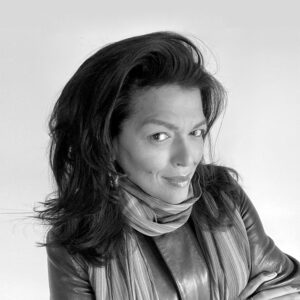Book Excerpt: Fleeing War-Torn Sudan to Fight Another Battle in the United States — for the Right to an Education
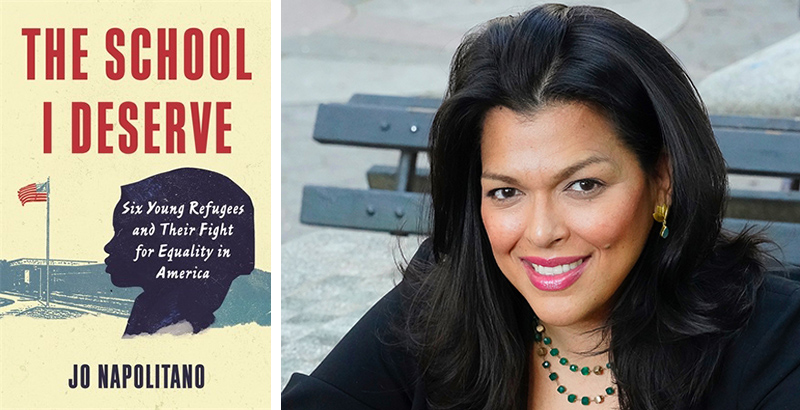
No matter where they come from or why they fled their homelands, child refugees and other young immigrants who arrive in the United States often seek to rebuild their lives through education. And the law is on their side. But not all are given the chance: Schools around the country have imposed barriers to enrollment meant to keep them out – and with great success. In The School I Deserve: Six Young Refugees and Their Fight for Equality in America, journalist and The 74 contributor Jo Napolitano illuminates the civil rights battle waged across the nation on their behalf. The book, which has already garnered positive advance reviews from Publisher’s Weekly, Booklist and Kirkus Reviews, focuses on a landmark 2016 case brought by the ACLU and the Education Law Center against the School District of Lancaster, Pennsylvania, for refusing to admit older, non-English speaking refugees and routing them to a “high-discipline” alternative school. The case marked a rare and fragile victory for these children in a particularly divisive era. In this excerpt from the opening chapter, adapted with permission by The 74, the book depicts the journey of eighteen-year-old Khadidja Issa from the horrific violence in war-torn Sudan to Lancaster and her dreams of bettering her life in America by first enrolling in school.
Khadidja Issa spent the early morning hours of August 16, 2016, consumed with worry. By the time her lawyer pulled up to her family’s modest apartment at 7:00 a.m. to retrieve her, she was wide awake, just as she had been all night. The eighteen-year-old Sudanese refugee, who had moved to Lancaster, Pennsylvania, in the fall of 2015, had no idea what the day would bring. Never before had she seen the inside of a courtroom — not in America and not in her home country. But there she was on that cloudless summer morning, about to embark on a ninety-minute journey to Easton, Pennsylvania, to tell a federal judge why she was suing her local school district just ten months after arriving in the States.
The sinewy teen was too fidgety to eat, but, dutiful as she was, she scrambled eight eggs for her mother and five younger siblings and set the meal aside in a chipped ceramic bowl so that breakfast would be ready when they woke a half hour later. The task complete, she headed back upstairs to smooth her hair and dress for the occasion. Eager to impress the court, she picked out her finest clothes: a pair of dark blue jeans faded at the thigh, a crisp, white long-sleeved shirt a touch too big for her narrow frame, and, to the amusement of her attorneys, a spotless pair of gold-colored high-top sneakers. She tucked her pale blue headscarf behind both ears and headed for the door, trying to remember what her mother, Mariam, had been telling her all week: “Just listen to the lawyers. They’ll know what to do.”
The day had just begun but already had broken a dozen years of tradition. As the eldest daughter in a Sudanese family, Khadidja was tasked with caring for her younger brothers and sisters and had spent every morning for the past twelve years waking them from sleep and corralling them for breakfast. As soon as she was able, she took to carrying the smallest among them in a sling on her back. By the time the family arrived in Lancaster, only baby Howa was young enough to be secured this way, her legs straddling Khadidja’s slender waist as she swept the floor or washed dishes. From the front, it often looked as though the teen had sprouted two tiny feet from her sides.
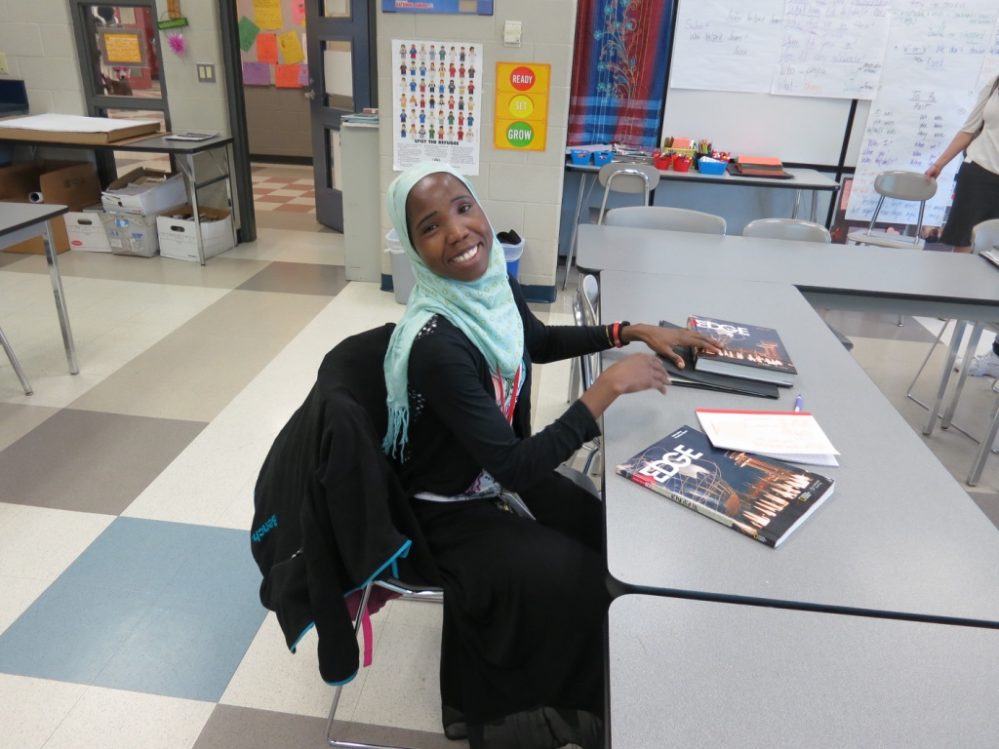
Though she enjoyed her place in the family hierarchy — a sideways glance from Khadidja could stop a fight in an instant — she aspired to be more than a caretaker. She dreamt of becoming a teacher or a nurse, and she learned from the adult refugees and volunteers who visited her family during their initial months in the States that such a journey could begin in only one place: her local public high school. Khadidja had no doubt she would be admitted. All three of her school-aged siblings were accepted with ease. One by one, they filled out the required paperwork, winced through their immunization shots, and tried their best to pull together the necessary school supplies.
But Khadidja wasn’t given that chance. When she met with school officials inside the district’s administrative offices in the fall of 2015, they told her through an interpreter she was too old to enroll and should instead look for work. “But I do not want to get a job,” she pleaded in Arabic, her voice a high-pitched chirp. “Why would I work if I don’t get an education?”
Sure, a low-wage job would allow her to more immediately bridge the gap between her mother’s meager wages, the family’s welfare benefits, and their ever-growing pile of bills. But Khadidja knew the only way to truly lift her family from poverty was to complete high school and then college, to qualify for a position that would bring home several times the income she would earn on a grimy factory floor.
Even more than that, she wanted to finally take control of her life. Ever since she was a little girl, Khadidja had lived on other people’s terms. But there was nothing she could do. School officials refused to back down, hoping to wait her out as they had a hundred other refugees in recent years. One by one, they came from the most troubled hot spots around the globe, hoping for a fresh start in America. And one by one, they were told they had aged out of their high school education, a lie that would cost them their future.
Khadidja, careful to maintain her dignity despite her exasperation, left the building in silent defeat and cried for days about her exclusion. “Why is this happening?” she would ask her mother. “Why won’t they let me go to school like everyone else?” Mariam, equally as perplexed as her daughter, had no answers.
Every morning for the next four months, Khadidja watched from the window of her family’s apartment as her younger brothers and sisters took off for school, and every afternoon, she waited for them to burst through the front door with new knowledge. She was proud of their achievements, but their success only highlighted her failure. After just a few months in the classroom, they had begun to unravel the complexities of conversational English, so much so that they were losing their mother tongues of Fur (spoken in Darfur, Sudan) and Arabic. Their minds, overstuffed with the language and culture of a new nation, could retain only a finite amount of information before the older files had to be purged.
At first, Mariam held on to the hope that her children would have room in their heads for both, but the notion was shattered when one of her sons, Djalale, sitting down to dinner with a fork in hand, asked his mother what the utensil would be called in Fur. “Oh, my God!” she said through a burst of nervous laughter, in awe of how much her children had already lost.
While her younger brothers and sisters were beginning to change in ways large and small, this was far less true of Khadidja, who held on to every word from her childhood. After living almost half a year in America, she remained linguistically crippled, unable to answer even the simplest of questions in English.
Her native languages were of little use outside her home, leaving her increasingly isolated, but not alone. Khadidja didn’t know it, but she wasn’t the only refugee who had been barred from the district that year. Mahamed Hassan, a seventeen-year-old from Somalia, also was turned away, alongside several others. Many of the would-be students didn’t know that every school-age child in America — no matter where they come from or how they arrive — is entitled by state and federal law to a public education in the community in which they live.
Each state determines its own cutoff age. For some, it’s as low as nineteen. For others, it stretches until twenty-six. Students in Pennsylvania can remain in school through the semester in which they turn twenty-one.
But the on-the-ground reality often deviates from the law because older students who struggle with English are not a desirable demographic. They are less likely to graduate high school within four years as compared to their peers, making them a hot potato for schools already struggling to serve their general population. Some administrators will do almost anything to curb their enrollment, routing them to online programs, adult education courses, or job training. What they fail to understand or intentionally ignore is that students who have not yet mastered English have the same educational rights as all others. Black, Hispanic, poor, and differently abled students also lag in high school graduation rates, and none can be refused admission because of their race, ethnicity, economic status, or academic ability. But with few advocates inside and outside the classroom, schools can easily cast non-English-speaking students as outsiders. When this happens, their education morphs from a right to a privilege, one that can be rescinded at will. Suddenly, schools are deemed generous — as opposed to merely law-abiding — for allowing them in.
Of course, the cost of denying a child’s education is enormous for both the individual student and their community. Those who are refused admission or who drop out before they can obtain a high school diploma will face dire outcomes: Not only will they earn more than $1 million less during the course of their lifetimes as compared to their college-educated peers, but they also will be twice as likely to live in poverty and face triple the unemployment rate.
One by one, they came from the most troubled hot spots around the globe, hoping for a fresh start in America. And one by one, they were told they had aged out of their high school education, a lie that would cost them their future.
They also are far more likely to be arrested and to battle a serious chronic illness. But perhaps the most troubling and surprising statistic involves mortality rates: those who fail to earn a high school diploma die, on average, ten years earlier than students who completed college. Outcomes are likely worse for those who also must battle a language barrier.
Khadidja refused to resign herself to such a fate. If she wanted to die early, she reasoned, she would have stayed in Sudan.
Some of the refugees who were turned down by the Lancaster school district dropped the matter and searched for low-wage work; regional poultry plants might be empty without them. But others, including Khadidja and Mahamed, continued to press for admission with the help of their refugee resettlement caseworkers and translators.
After months of cajoling, the district finally agreed to enroll them, though the offer wasn’t what they expected. The refugees assumed they would be sent to the district’s main high school, McCaskey. The school was divided into two equally impressive buildings, and its pristine campuses had an International School for students just like them who needed help learning English. Khadidja’s younger sister, Nouracham, was thriving there. But the district had other plans for older students, whom administrators believed had a slim chance of graduating.
Khadidja, Mahamed, and the other refugees ages seventeen and older were instead assigned to a high-discipline “alternative” school called Phoenix Academy. Housed inside a low-slung black-and-white building that some say better resembled a jail than a school, it was billed as a behavior modification program, one designed to rehabilitate troubled youth. While it was technically part of the school district, Phoenix had been outsourced to a private company called Camelot Education and operated under a far stricter set of rules as compared to McCaskey or most other American high schools. Phoenix didn’t aim to merely educate its students but rather to transform them into something else. According to its 2015–2016 student handbook, the academy pledged to change students’ behavior from “anti-social” to “pro-social” and to help them develop the life skills needed to sustain the switch.
Mahamed, handsome and charming with a wavy tuft of hair like a dollop of whipped cream atop his head, had heard about Phoenix through the refugees he met in Lancaster, each of whom had been in the country a year or so longer than he had. Those assigned to the campus or whose siblings had been made to attend couldn’t wait to get out. “It’s a school for bad kids,” they would tell him, meaning chronic truants who were dangerously close to flunking out or students who had gotten into so many fights at McCaskey that they could no longer be trusted at the mainstream campus. Mahamed wondered what he did to warrant such a placement.
Phoenix’s attendees, who were made to adhere to a strict dress code, were also closely monitored, subject to daily pat-downs. They were required to remove their shoes upon entry and to bang them together to prove they were free from contraband, including drugs and weapons. Backpacks were banned and students were not permitted to take books home. As a result, they had no homework, hampering their ability to improve their English once the school day ended.
But Phoenix’s most controversial practice by far was its Handle With Care protocol, a physical restraint technique that would land students against a wall or on the ground with their hands pulled behind their backs within seconds, even for minor infractions. The procedure was supposed to be a last resort, but teachers and staff were said to have used it without proper cause. Camelot ran nearly forty campuses nationwide, all for so-called at-risk youth, and had been dogged by allegations of abuse in several cities, including nearby Reading, Pennsylvania, where cameras caught a staff member swinging a student into a wall headfirst.
The United States District Court in Easton, Pennsylvania, was the last place Khadidja could ever have imagined herself. It was only a year earlier that she was living in a squalid refugee camp halfway around the world.
Born in Darfur, Sudan, in 1998, Khadidja spent her early years trying to outrun a notorious militia hell-bent on exterminating her entire ethnic group. She fled the country at the age of five to escape the tyrannical leadership of President Omar al-Bashir, who, through the militia, had orchestrated the murder, torture, and rape of hundreds of thousands of civilians. Among those he targeted was the Fur ethnic group to which Khadidja and her family belonged.
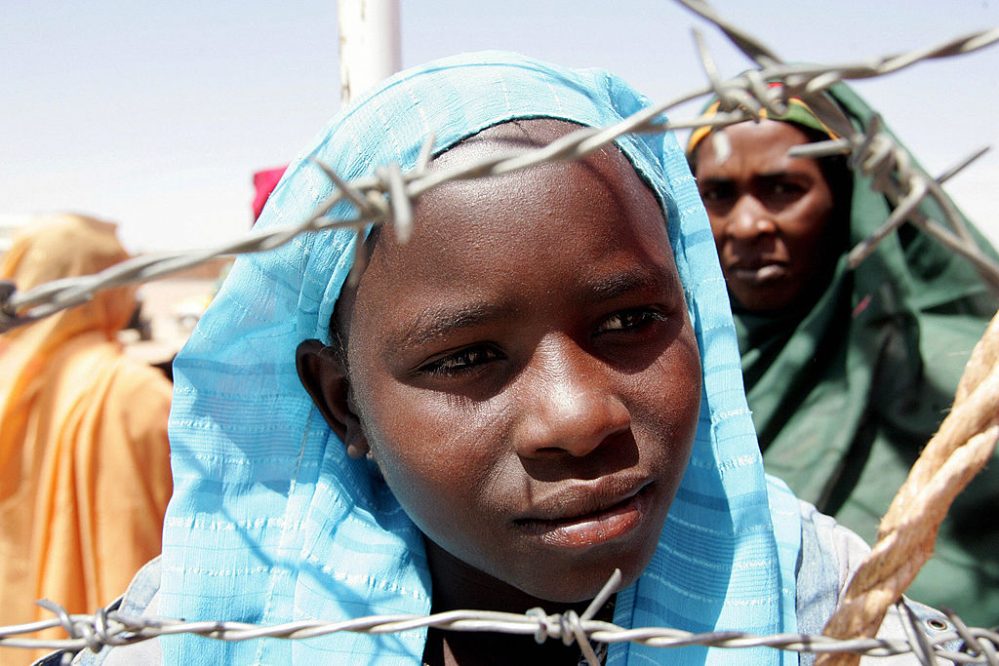
The violence that pushed Khadidja from her home was not new: Civil wars had killed or displaced millions since the mid-1950s. The conflicts, fought on multiple fronts and made worse by drought, reached back generations and had shaped Khadidja’s entire life path, even before she was born. Her mother, Mariam Abdelaziz, had moved with her parents several times in her youth to avoid the bloodshed. Born in 1981, Mariam was accustomed to the constant uprooting. She was forced to abandon her education in the sixth grade after the Janjaweed, or “devils on horseback,” leveled her school and surrounding village. With few other options, she married at age fourteen and had Khadidja four years later.
Twenty-five of Mariam’s relatives would die in the war, which burst forth with apocalyptic vigor at the start of 2003. The scorched-earth tactics of the Janjaweed left entire communities slaughtered, their belongings looted, their animals killed, and their water supplies contaminated with the bodies of the dead.
“We walked until our feet swelled. If we didn’t turn away, we would have been killed. All of us.”
With no other viable option, Khadidja and her family abandoned their home, cast aside nearly all of their belongings, and joined thousands of others in a harrowing march out of Sudan to the neighboring country of Chad. “We walked until our feet swelled,” Mariam recalled. “If we didn’t turn away, we would have been killed. All of us.”
When the refugees finally arrived at the Chadian border, they came upon an unexpected obstacle — a valley that, to their surprise, was filled with water. The Darfurians, who could not swim, lined the river in a panic, with the Janjaweed not far behind. Mariam was sure they would be shot or would drown trying to escape. What happened next, she said, was all but biblical. The Chadians who saw the refugees frozen at the water’s edge jumped in to save them, carrying each rail-thin Darfurian to the shoreline on their backs. Mariam was amazed when the entire group made it across alive.
After their rescue, the Darfurians, including Khadidja and her family, waited inside Chad for months as the United Nations Human Rights Council processed their paperwork. It was during this time that Mariam realized the benefit of an education: Educated refugees were hired by the UN to help build and run the camps. Able to earn a decent paycheck, they were far better off than Mariam and Adam, who had no choice but to beg local villagers to hire them for low-wage manual labor so they could feed their girls. Worse yet, the couple had to leave Khadidja and Nouracham, ages five and three, alone for eight hours a day with little food and water and zero supervision. “I was worried, but I didn’t have a solution,” Mariam said. “When we came home, everything was happening — crying, fighting. All of the kids were in bad shape at that time because there was nobody there to care for them.”
Eventually, the family was admitted to the Goz Amer refugee camp, a fragile, flammable site that would grow to hold twenty thousand people. Plagued with fires and occasionally penetrated by militia groups, the overcrowded camp was one of the most difficult to keep safe. But the bare-bones site was the family’s best option, though it could not erase the trauma they had already endured.
The journey had aged Khadidja nearly overnight, transforming her from a petulant little girl to an obedient and precocious child, one who regularly asked her mother the toughest of questions: “Why do we have to go through this? Why did we have to leave our country? When can we go back home?” Mariam, too exhausted to sugarcoat things, told her daughter the truth. “There is no home to go to,” she said. “Those who stayed behind were shot dead.”
Mariam gave birth to two sons in their first few years at the camp. Bolstered by his strong Muslim faith, Adam was determined to care for his growing family as best he could. He replaced their sweltering UN-issued tent with a far cooler straw hut and eventually found work picking tomatoes and watermelons at a nearby farm, using the money to supplement the family’s modest allowances of oil and flour.
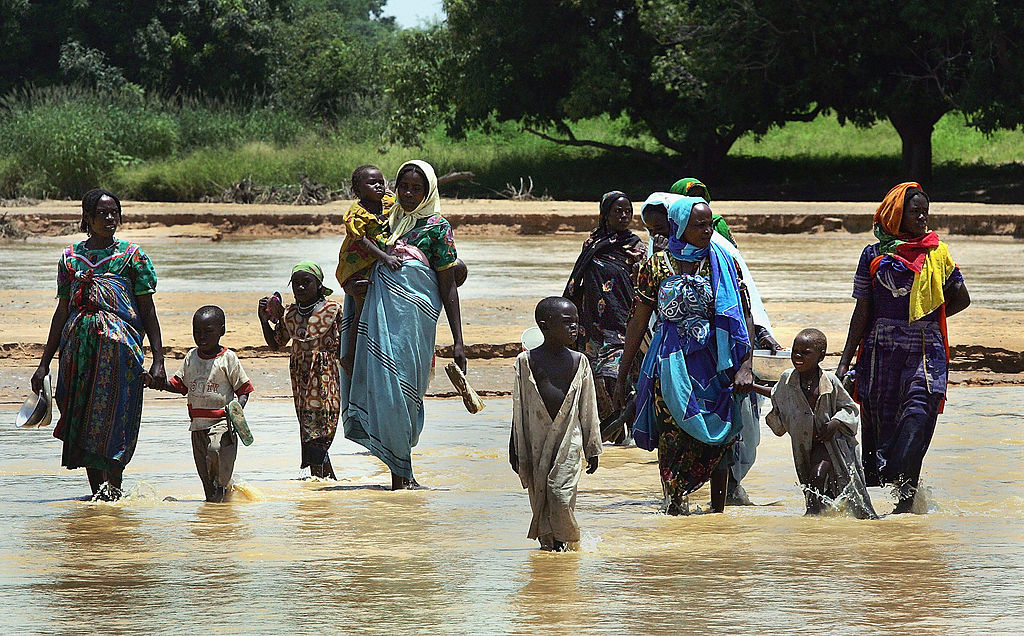
The work was grueling and the commute even worse: the farm was an hour away on foot, and to get there, Adam had to cross an unpredictable river. The water level was usually low, reaching only his knees, but it could change in an instant during the rainy season.
In the end, its volatility proved deadly: On August 5, 2007, Adam drowned as he was attempting to return home from work. “He thought he could walk it, but it was up to his neck,” Mariam said.
The young widow searched for her husband for eight days. His body was never recovered, though she eventually found his clothes and shoes downstream. “I don’t even have a single photo of him,” she said. “But if I want to see his face, all I have to do is look at my oldest boy, Ibrahim.”
Adam was the only man Mariam had ever loved, and though she was heartsick, her grief quickly morphed into worry as she wondered how she could provide for her family in his absence. With no other choice, she decided to replace Adam on the farm — and to bring her four children with her. Mariam strapped baby Ibrahim to her back while nine-year-old Khadidja carried her infant brother, Djalale. Nouracham, who was seven at the time, walked alone. The family’s workday started at dawn and ended at dusk, bookended by a one-hour walk each way, plus the time it took to cross the river — all for $5 per day. The money was enough to buy a handful of onions, a fistful of meat, and maybe a vegetable or two, but nothing else. The children, who attended school only in the summer when the farm was not in operation, had just three changes of used clothes each, purchased every two years with their maternal grandparents’ help. They had little time or opportunity for entertainment.
A refugee who somehow obtained an old television set charged his neighbors five cents apiece to watch it, but at such a high price, Mariam’s family caught only a few glimpses. It was where they saw their first images of America, a few flickering pictures of its streets and cities in a show they can no longer remember.
Khadidja, who at first could only babysit her younger brothers and sisters, soon was able to help with the manual labor, spending her youth hunched over in the punishing Chadian sun, sweat pouring down her back as she thrashed wheat alongside her mother. She rarely complained about her circumstance: Teenage tantrums are a luxury of the rich.
Though their homeland was in shambles, factions of Mariam’s extended family — including her mother — had moved back to Darfur, hoping to resume the life they once had. Mariam and her children joined her mother for nearly two years when Khadidja was in her mid-teens but ultimately returned to the camps. Her mother’s home was intact, but much of their village was destroyed and there was no school for her children to attend. Despite these challenges, life moved on: Mariam remarried and had another child, a boisterous daughter named Rania. But she and her husband could not agree on whether to remain at the camp or return to Darfur and the couple soon divorced. Years later, Mariam married for the third time. Her husband, Alsadiq, looked after her children like they were his own. Finally, she had a tender confidant to share in the joys and burdens of parenthood.
In 2012, nine years after they first fled their home in Sudan, Mariam learned that she and her family were going to be relocated to the United States. It took another three years for their paperwork to be processed. When it came time to leave, the family was reluctant, not celebratory: The move meant they would leave behind their aunts, uncles, cousins, and grandparents — and it was unlikely they would ever be reunited.
Mariam also would have to part with Alsadiq — there was a problem with his paperwork — with whom she was pregnant with her sixth child. She considered forgoing the trip, but her parents told her it was unthinkable to turn down the opportunity to live in America. “If you stay here, your children will have no future,” Mariam’s mother told her. “You must give them a chance.”
Unable to bring even a single suitcase on the journey, the family left the camp with nothing. Mariam gave their clothes, furniture, bedsheets, and kitchen supplies to one of her sisters and boarded a plane for America in October 2015 without a single dollar in her pocket.
When the family landed in New York City, they were immediately shuttled 170 miles west to Lancaster, where volunteers had already set up their spartan living quarters inside a plain, three-story red brick building in the worst section of town. Mariam was touched by the care and dedication of the resettlement staff and also by the willingness of complete strangers to prepare her new home, no matter how run-down.
Khadidja, her mother, and her five siblings shared just one bathroom, leaving the children to pound their fists on the door whenever it was in use for too long. The less serious the need—the girls were particularly chided for using it to fix their hair—the louder their name would be screamed until they vacated it.

Everyone shared their bedroom with at least one other person, except for Khadidja, who slept each night in an upstairs hallway with no privacy at all. Her full-sized bed, covered in mismatched but immaculate sherbet-green sheets, was wedged between a worn hand-me-down dresser and a wonky air conditioning unit that spewed cold air onto the crown of her head. Khadidja never complained about the bed’s location. In the States, she and her family were free from persecution. Everything else was aesthetic.
As for her mother, Mariam was required to immediately begin unpaid labor in exchange for all America had given her. She started cleaning a local resettlement office and was later hired as a maid at a nearby hotel, earning $9 an hour. By some measures, the job was a good one. Her boss was flexible and understanding when she needed to tend to a sick child. But he would send her home hours early and without pay if the hotel had too many vacant rooms, so her earnings never met the family’s needs.
Mariam did not want her children to be similarly hamstrung. She wanted them enrolled in school as quickly as possible and for Khadidja to set an example as the first to go to college. But the school district’s decision to turn her away put their dreams on hold. When they arrived in the States, Khadidja had only a sixth-grade education, just like her mother. And it looked as though she would go no further.
Excerpted from The School I Deserve: Six Young Refugees and Their Fight for Equality in America by Jo Napolitano. Copyright 2021. Excerpted with permission by Beacon Press.
Get stories like these delivered straight to your inbox. Sign up for The 74 Newsletter

;)
